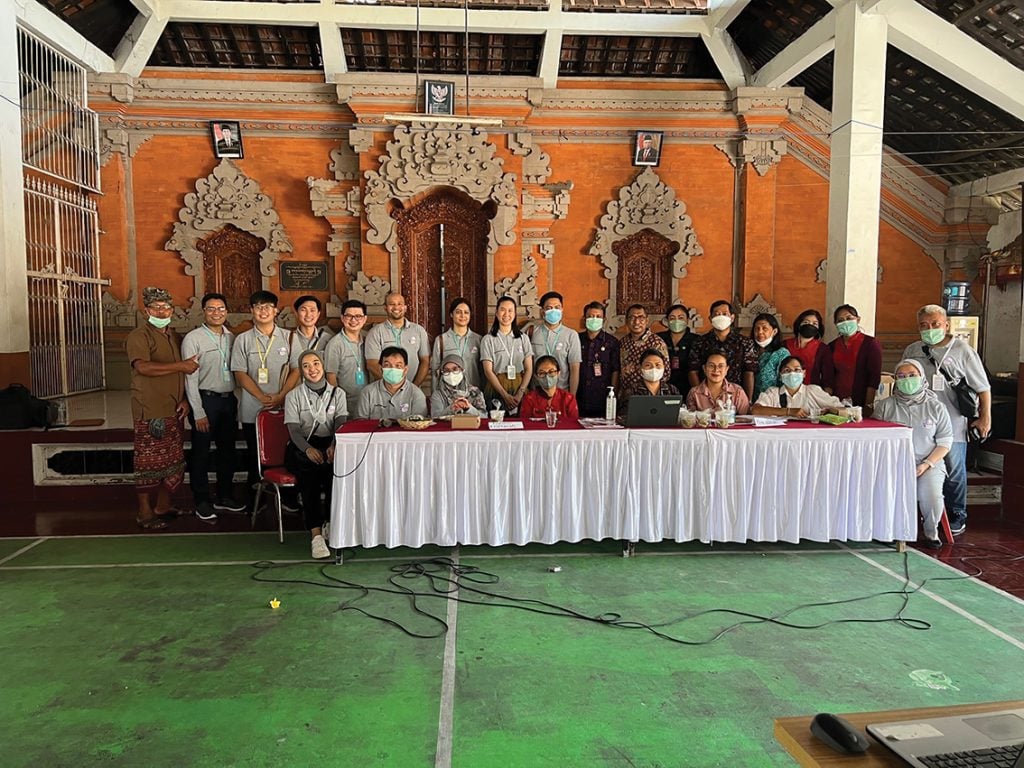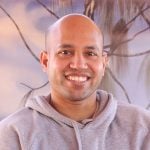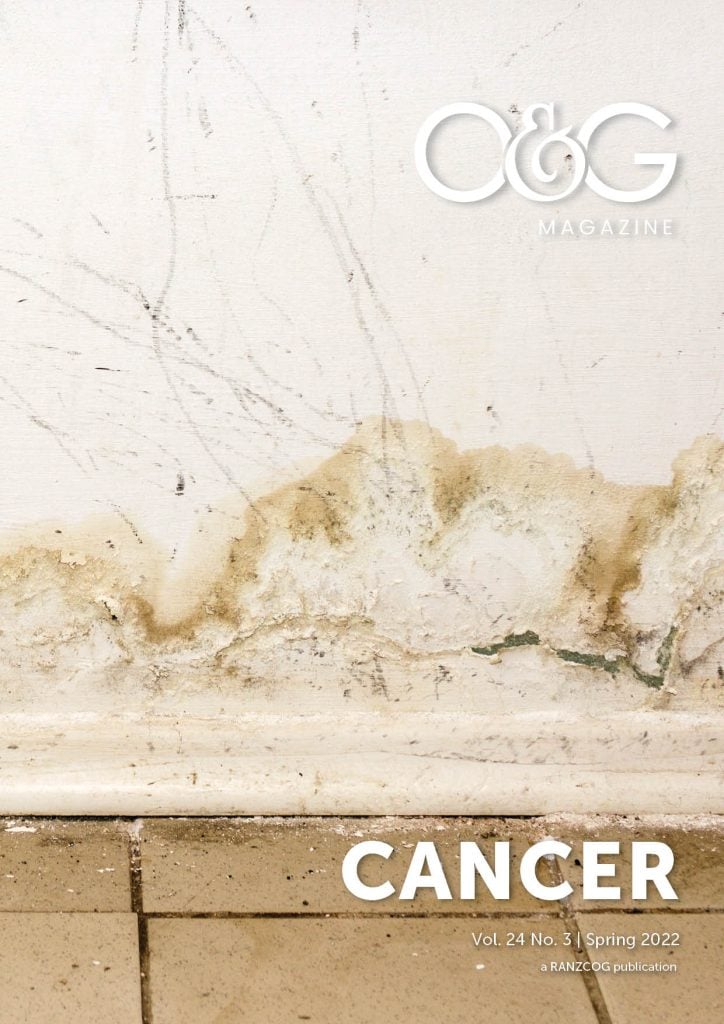We boarded the flight from Melbourne on 19 May 2022, a bit nervous as this was our first overseas flight in two years. The flight was pleasant, but the queues in the airport for infection control were extremely long. Indonesia had some of the most stringent travel rules, and they were only slowly getting relaxed.
While there was excitement, there was a bit of nervous anticipation around the post-pandemic dive into this Community Fellowship Program (CFP) and the AOFOG Congress experience in Bali. The 10 Young Gynaecologist Awardees (YGAs) from the Asia Oceania region had already had an interactive Zoom call (yes, the lifesaver of the Covid-19 pandemic!), so it was apparent that it was an enthusiastic cohort.
On exit from the Bali airport gates, we were pleasantly overwhelmed by the warm welcome from the organisers at the gates. We were taken to our hotel, and it was obvious Bali was back in business with tourism with billboards about the upcoming G20 summit and the local government’s emphasis on ‘Rebuilding Together.’ We were already witnessing their trademark hospitality.
On 20 May, we had our first social event where we were invited for an introduction to the organising committee and the AOFOG secretariat. This event also included ice-breaking activities for the participants to mingle and share initial thoughts. Dr Kania Praharsini was our liaison doctor throughout the CFP, and Dr Dian Tjahyadi was responsible for the overall CFP organisation. Their passion and hospitality made this a genuinely enjoyable experience.
We witnessed traditional dance, live music, and local cuisine, and it felt like the start of a new friendship with global colleagues. What struck me most was the natural keenness we had to talk about experiences in our countries and the barriers to equitable women’s health, even in this informal setting. The CFP was intended to be a platform for sharing ideas between O&Gs in 10 countries of Asia Oceania to identify problems and collaborate to improve women’s health locally and globally. The commitment to this platform was on a firm footing from all the participants.
On 21 May, the CFP formally started. We went on a field trip to an integrated primary health centre, ‘Posyandu’, in South Kuta and witnessed medical appointments carried out alongside an educational program on reproductive health for adolescents. On our return to our convention venue, in continuation of the theme from the morning, we were provided with an overview of the World Health Organization (WHO) Millennium Development Goals transitioning now to Sustainable Development Goals.1 We focused on Asia Oceania and especially on the impact of PPH in accounting for the lives of women in developing and underdeveloped settings.
We were then provided with the Indonesian collaboration context to reduce maternal death. In Australia, the maternal death rates are extremely low,2 so it led to an eye-opening and exciting exchange of ideas, experience and a drive to try and be an advocate for equitable access to quality healthcare for women across the region as a whole. On 22 May, we had a moving virtual premiere of ‘Voices from the field’,3 which reminded me of my time in India dealing with PPH and the disparity between developed countries where I work now and underdeveloped countries where I have had opportunities to work in the past.4
These were followed by plenary sessions on reducing maternal and neonatal deaths on an interactive platform with sharing ideas across the table. That evening we were taken to the Uluwatu temple. We attended the ‘Kecak Dance’, followed by dinner by the bay, which provided the perfect opportunity to soak in the local culture in a relaxed environment and reflect on the learnings thus far.
On 23 May, we prepared our group resolution on conceptualising pathways to reduce maternal death and improve women’s health globally, focusing on the Asia Oceania region.
The main emphasis of our report was the decentralisation of tertiary care and the involvement of young O&Gs to bridge the gap and iron out inequity. We also thought building platforms for communications within countries and across the Asia Oceania regions was crucial. We presented that this needed the active support of national O&G societies and not-for-profit organisations.
Team-building games and activities followed this as the CFP ended. We practised a local Indonesian dance on the CFP days. Some of us were natural dancers, and some were shy, but by the end of the rehearsal, we were all thoroughly enjoying each other’s presence in the dance performance. We presented it to the dignitaries at Presidents night on 23 May with a brief introduction to our country of representation and our thoughts on the fellowship program.
During the President’s social night, I was fortunate enough to have some of the most stimulating conversations with Prof Mary Ann Lumsden, Chief Executive of FIGO, and Dr Eddie Morris, President of RCOG UK. The theme from all the O&G leaders seemed to emphasise harvesting young O&Gs’ energy in shaping global women’s health.
The AOFOG congress covered the length and breadth of updates in O&G, from essential interventions to cutting-edge innovation. It provided an opportunity to hear from the experts and upcoming researchers. In the free communication session, I presented my research on ‘risk reduction salpingectomy’. I found the FIGO session at the congress most informative, reminding us of the critical global needs in women’s health. I was fortunate to interact with RANZCOG President Dr Benjamin Bopp, and we discussed the CFP experience. Dr Bopp echoed the sentiment around the vital role of young O&Gs.
I am happy and very proud of my attendance, and the experience gained therein. I was also able to provide an Australian perspective to many discussions. It energised my commitment to work in global health and ideas that can be implemented at local or international levels. I also learned about disruptive innovation that could prevent maternal deaths at a fraction of current costs.
The networking experience was very beneficial and has provided all CFP attendees with a platform to share ideas, and we are all in touch via social media. I am delighted that I could represent RANZCOG and Australia and look forward to more such opportunities.
Dr Debjyoti Karmakar participated in the 2022 AOFOG Congress and Community Fellowship Program courtesy of the RANZCOG Shan S Ratnam Young Gynaecologist Award, as supported by the RANZCOG Women’s Health Foundation.

Young Gynaecologist Awardees at the local Posyandu, an integrated primary health centre, in South Kuta
References
- Morton S, Pencheon D, Squires N. Sustainable Development Goals (SDGs), and their implementation: A national global framework for health, development and equity needs a systems approach at every level. Br Med Bull. 2017;124(1):81-90.
- Welfare AIoHa. Maternal Deaths: Australian Institute of Health and Welfare; 2021.
- Day K. Voices From the field. 2022.
- Suarez S, Conde-Agudelo A, Borovac-Pinheiro A, et al. Uterine balloon tamponade for the treatment of postpartum hemorrhage: a systematic review and meta-analysis. Am J Obstet Gynecol. 2020;222(4):293.e1-.e52.





Leave a Reply